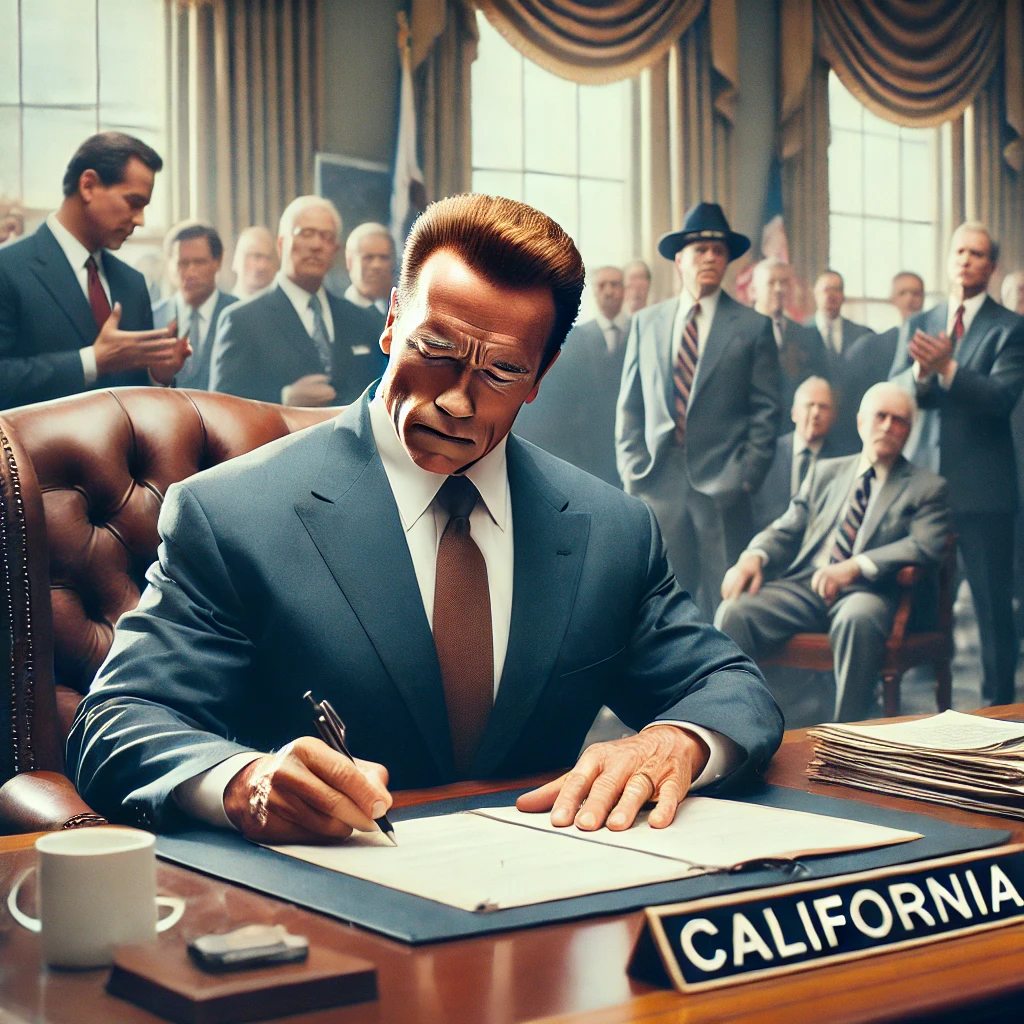On October 7, 2003, Arnold Schwarzenegger, the world-renowned bodybuilder, actor, and cultural icon, was inaugurated as the 38th Governor of California. His election was the culmination of a remarkable political journey that captured the attention of the nation and marked a significant shift in California’s political landscape. Schwarzenegger’s victory in the gubernatorial recall election not only changed the state’s leadership but also showcased the influence of celebrity in American politics.

The Recall Election
The journey to Schwarzenegger’s governorship began with a political upheaval in California, as public discontent with the then-Governor Gray Davis reached a boiling point. Davis faced criticism over the state’s budget crisis, rising energy costs, and an economy struggling to recover from the dot-com bubble burst. This dissatisfaction led to a recall election, where voters were given the opportunity to remove Davis from office.
As the recall campaign gained momentum, Schwarzenegger announced his candidacy, positioning himself as a political outsider capable of bringing change. His celebrity status and charisma resonated with voters, appealing to both Republicans and Democrats who were eager for a fresh approach to governance. The recall election on October 7, 2003, resulted in a landslide victory for Schwarzenegger, who received nearly 49% of the votes cast for replacement candidates, defeating a crowded field that included experienced politicians.

The Inauguration and Early Challenges
Schwarzenegger was sworn in as governor just weeks after the recall election, taking office on November 17, 2003. His inaugural address emphasized his commitment to addressing California’s pressing issues, including the budget crisis, education reform, and infrastructure development. Schwarzenegger’s background as a successful businessman and his experiences in Hollywood shaped his approach to governance, focusing on pragmatism and collaboration.
However, the challenges facing Schwarzenegger were significant. He inherited a budget deficit of over $38 billion, prompting immediate calls for fiscal reforms. His administration faced scrutiny over proposals to address the financial crisis, including cuts to social programs and potential tax increases. Despite his initial popularity, Schwarzenegger quickly learned that the complexities of governance required more than star power; it demanded negotiation and compromise with a diverse and often divided legislature.
A Mixed Record in Office
During his time as governor, Schwarzenegger implemented several key initiatives, including reforms in education and environmental policy. He championed the California Global Warming Solutions Act of 2006, which aimed to reduce greenhouse gas emissions and positioned California as a leader in environmental policy. His efforts to address climate change received praise and established a legacy of environmental advocacy.

However, Schwarzenegger’s tenure was not without its challenges. His attempts at bipartisan collaboration were often met with resistance, leading to political gridlock. In 2005, he faced a series of setbacks with ballot measures aimed at reforming the state’s governance and political structure. The public’s disillusionment with the political process began to affect his popularity, demonstrating the complexities of leading a diverse and populous state like California.
The Celebrity Factor and Its Implications
Schwarzenegger’s election as governor underscored the growing influence of celebrity in American politics. His status as a global icon brought significant media attention to the governor’s office and generated enthusiasm among voters who were eager for change. However, his celebrity status also raised questions about the qualifications necessary for political leadership and the impact of fame on governance.
Schwarzenegger’s governorship inspired a wave of discussions about the role of celebrities in politics, as other figures began to consider running for office. The phenomenon highlighted the intersection of entertainment and politics, reflecting changing societal attitudes toward leadership and representation.
The End of an Era
After serving two terms as governor, Schwarzenegger chose not to seek re-election in 2010. His time in office ended amidst ongoing budget challenges and a fluctuating political climate. While his administration faced criticism and mixed reviews, Schwarzenegger’s impact on California politics was undeniable. He left office with a complex legacy, characterized by significant achievements in environmental policy and ongoing debates about fiscal responsibility and governance. The election of Arnold Schwarzenegger as Governor of California on October 7, 2003, marked a significant turning point in both state and national politics. His rise to power as a political outsider reflected the changing landscape of American governance and the allure of celebrity. As California continues to navigate its unique challenges, the lessons learned from Schwarzenegger’s governorship serve as a reminder of the complexities of leadership and the need for effective governance in a diverse and dynamic state. His legacy remains a testament to the evolving relationship between entertainment, politics, and public policy in the United States.
